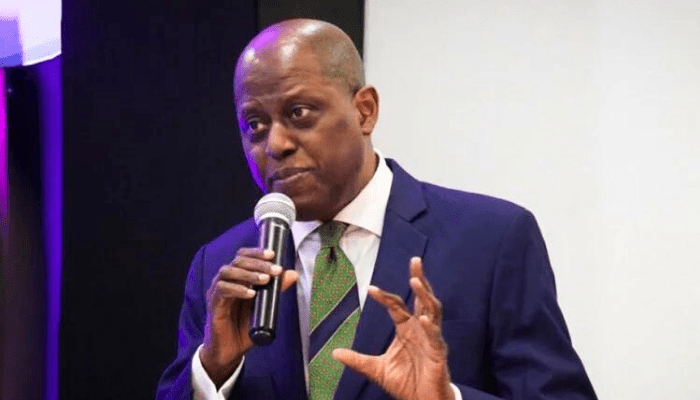By Joseph Ekeng
In a landmark policy address at the Chartered Institute of Bankers of Nigeria’s annual dinner in Lagos, Olayemi Cardoso, the recently appointed Central Bank governor, unveiled a comprehensive and ambitious roadmap to guide Nigeria through a period of economic transformation. The speech, eagerly awaited since his assumption of office in September, touched upon various crucial aspects of monetary policy, economic growth, and financial sector stability. Here’s an in-depth analysis of the key points from Cardoso’s inaugural speech:
1. Bank Recapitalization: Paving the Way for Economic Expansion
Cardoso began his address by underlining the critical importance of the banking industry’s capacity to meet the demands of a burgeoning economy. In the face of Nigeria’s projected economic expansion, he asserted the need for a thorough assessment of the adequacy of the banking sector. To address this, Cardoso announced a mandatory increase in banks’ capital base, emphasizing the importance of fortifying the industry to ensure stability in the future.
This move serves as a proactive measure, reflecting Cardoso’s commitment to position Nigeria’s financial sector as a robust pillar supporting the nation’s economic ambitions. The directive to increase capital sets the tone for a resilient banking system capable of navigating the challenges of a larger and more complex economy.
2. $1 Trillion Economy in 7 Years: A Realistic Approach
In a departure from earlier expectations, Cardoso recalibrated the timeline for Nigeria’s ambitious goal of achieving a $1.0 trillion GDP. Contrary to the previously envisioned three-year target, he extended the timeframe to seven years. This adjustment, according to Cardoso, aligns with a clear roadmap of priority areas and strategic initiatives necessary for sustainable and inclusive economic growth.
Cardoso highlighted ongoing fiscal reforms, including the removal of petrol subsidies and the unification of the foreign exchange market rate, as instrumental in setting the stage for the envisioned economic expansion. By acknowledging the time required for these measures to manifest their impact, Cardoso demonstrated a realistic and pragmatic approach to economic goal-setting.
3. Stress Test Results: Acknowledging Vulnerabilities in the Financial Sector
While acknowledging the financial sector’s resilience in 2023, Cardoso did not shy away from revealing the results of stress tests conducted on the banking industry. These tests indicated underlying vulnerabilities, suggesting that banks might face challenges in withstanding sustained economic and financial stress, especially in more severe scenarios.
This admission of potential weaknesses underscores Cardoso’s commitment to transparency and risk management. By openly addressing the stress test results, he signals a readiness to tackle challenges head-on, reinforcing the importance of continuous evaluation and enhancement of the financial sector’s resilience.
4. Technology Regulation and Sanctions: Striking a Balance
Recognizing the pivotal role of technology in providing financial services and promoting financial inclusion, Cardoso issued a cautionary note. While acknowledging technology’s critical role, he expressed concerns about licensees operating beyond approved activities. The governor stressed the importance of adhering to prescribed boundaries, warning that intentional or unintended non-compliance would be subject to sanctions.
This emphasis on responsible technology use aligns with global trends in financial regulation, balancing innovation with risk management. Cardoso’s commitment to maintaining a regulatory framework that fosters technological advancement while mitigating potential risks reflects a nuanced approach to navigating the evolving landscape of financial services.
5. MPC Meeting Schedule for 2023: Ensuring Effective Policy Implementation
Cardoso clarified the Central Bank’s adherence to the statutory requirement for Monetary Policy Committee (MPC) meetings in 2023. However, his focus extended beyond mere compliance. He emphasized the need for these meetings to be not only regular but also useful and effective. This strategic approach aligns with Cardoso’s commitment to ensuring that monetary policy decisions translate into tangible outcomes.
Expressing confidence in the effectiveness of ongoing tightening measures, Cardoso signaled a proactive stance in managing inflation. By highlighting the declining rate of inflation growth as evidence of progress, he aimed to instill confidence in the efficacy of the Central Bank’s monetary policy tools.
6. FX Market Concerns: Addressing Challenges and Seeking Clarity
Expressing apprehensions about the readiness of the new foreign exchange (FX) market, Cardoso delved into the intricacies of the Nigerian Foreign Exchange Market (NFEM). He offered clarification on the 43 items previously restricted, emphasizing that these items were never outrightly banned but subject to restrictions in the official market.
Cardoso’s nuanced explanation sought to provide clarity on the factors influencing the premium between the parallel and official markets. By acknowledging the complexities and involving fiscal authorities in addressing trade policy issues, he signaled a commitment to a collaborative and comprehensive approach to FX market challenges.
7. Refocus on CBN Core Mandate: A Course Correction
In a candid acknowledgment, Cardoso admitted that the Central Bank had deviated from its core mandates, engaging in quasi-fiscal activities that injected over 10 trillion naira into the economy. These initiatives spanned diverse sectors such as agriculture, aviation, power, and youth development.
Cardoso’s commitment to addressing institutional deficiencies, restoring corporate governance, and strengthening regulations reflects a recognition of the need for a course correction. By pledging to implement prudent policies and recalibrate the Central Bank’s toolkit, he aims to restore the institution’s focus on its core objectives.
As an adviser to the government, Cardoso outlined a repositioning of the Central Bank as a catalyst for economic stability and growth. This strategic shift involves collaboration with stakeholders and the formulation of policies that create an enabling environment for sustained economic growth and development.
Cardoso’s inaugural speech as the CBN governor presents a comprehensive and ambitious vision for Nigeria’s economic future. His strategic initiatives, commitment to transparency, and nuanced approach to challenges signal a new era for the Central Bank, one focused on resilience, adaptability, and sustainable economic growth. As Nigeria navigates its economic trajectory, Cardoso’s leadership sets the stage for a recalibrated and robust financial landscape.





Comment
No comments found.